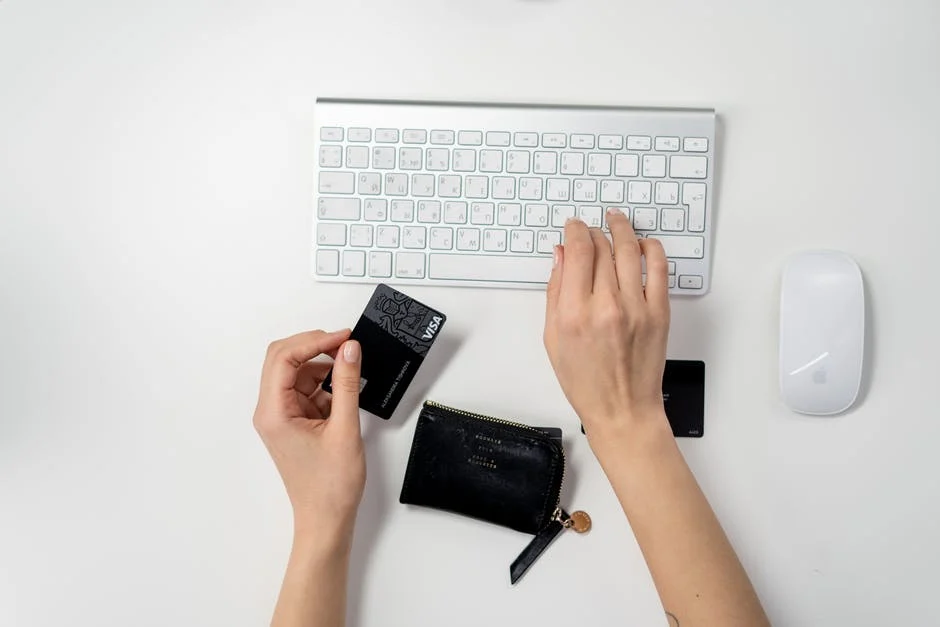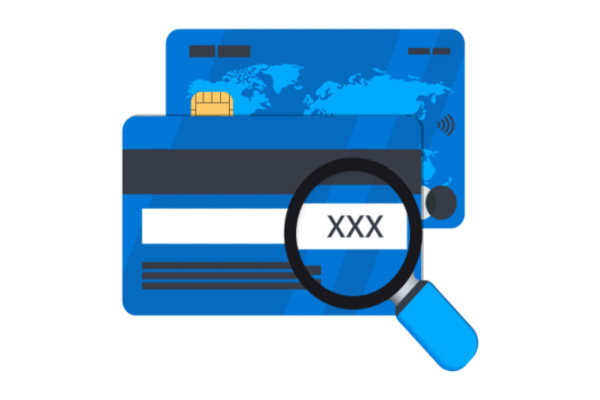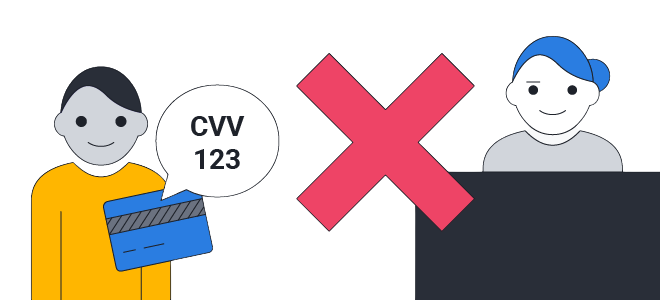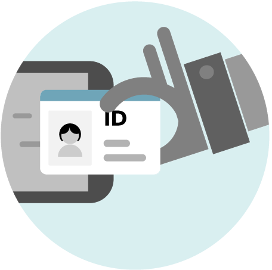What is a CVV code and how can you protect it? [2023]
Last updated on May 19th, 2023 in General

Are you familiar with the little three-digit number on the back of your credit or debit card? That’s right, we’re talking about the CVV code. Despite its small size and seemingly insignificant role in transactions, this code is actually a crucial line of defense against fraudsters looking to steal your hard-earned money.
In this blog post, we’ll delve into the world of CVV codes – how they work, why they’re important, and most importantly, how you can protect them from being stolen.
So sit tight and get ready to become an expert on all things CVV!
 The CVV (Card Verification Value) code is a three or four-digit number found on the back of most credit and debit cards. Its purpose is to add an extra layer of security to your transactions by verifying that you are in possession of the actual card.
The CVV (Card Verification Value) code is a three or four-digit number found on the back of most credit and debit cards. Its purpose is to add an extra layer of security to your transactions by verifying that you are in possession of the actual card.
When making online purchases, merchants typically require customers to input their CVV code along with other payment details such as the card number and expiration date. This helps ensure that the person making the purchase actually has physical access to the card rather than simply possessing stolen account information.
One thing worth noting is that while CVV codes offer additional protection against fraudulent activity, they do not guarantee full-proof security. It’s always important to monitor your accounts closely for any suspicious activity and report any unauthorized charges immediately.
Understanding what a CVV code is can help you better protect yourself from potential fraudsters looking to steal sensitive financial information.
CVV codes, also known as Card Verification Value codes, are three- or four-digit numbers that serve as a security feature for credit and debit card transactions. These codes act as an additional layer of protection against fraudulent activities by verifying that the person making the transaction has access to the card itself.
When you make a purchase online or over the phone, you will be asked to provide your CVV code along with your card number and expiration date. This information is then transmitted securely to your bank or credit card company for verification.
CVV codes work by generating a unique code based on a mathematical algorithm using various pieces of information associated with your account. This process ensures that each CVV code is specific to only one particular card and cannot be used interchangeably.
Furthermore, because CVV codes are not stored in any database or magnetic stripe on the actual physical card itself, they offer an added level of protection against theft and fraud. This means that even if someone were able to gain access to your credit or debit card number, they would still need your CVV code in order to complete any transactions successfully.
Understanding how CVV codes work can help you take steps towards protecting yourself from potential scams and fraudulent activity both online and offline.

CVV codes are an essential part of online transactions, and it is vital to protect them from fraudulent activities. Here are a few ways to safeguard your CVV code:
1. Never share your CVV code with anyone: Your bank or financial institution may ask for the CVV code during transactions, but never reveal it to anyone else.
2. Keep your card secure: Always keep your card in a safe place and never let it out of sight when making payments at a store.
3. Use trusted websites for online purchases: Only use reputable sites that have security measures in place to protect sensitive information like CVV codes.
4. Check statements regularly: Keep an eye on your account activity by reviewing statements carefully every month for any unauthorized charges.
5. Be aware of phishing scams: Scammers may try to trick you into revealing personal information, including your CVV code, through emails or phone calls posing as legitimate entities such as banks or credit card companies.
By following these simple steps and being vigilant about protecting your information, you can help prevent fraudsters from accessing and misusing your valuable data.
If you suspect that your CVV code has been stolen, it is essential to act fast. The first step is to contact your bank or credit card company and inform them of the situation. They will be able to cancel your current card and issue a new one with a different CVV code.
It’s also important to check your account activity regularly for any unauthorized purchases. If you do find any fraudulent transactions, report them immediately to your bank or credit card company.
In addition, consider changing any passwords associated with the compromised account and enabling two-factor authentication wherever possible.
To prevent future occurrences of CVV theft, be cautious when sharing personal information online and only use secure websites for financial transactions.
Remember that protecting your CVV code is crucial in safeguarding against identity theft and financial fraud. Taking proactive steps can help mitigate potential damage from a stolen CVV code.

The possibility of someone stealing your CVV code online is a genuine concern in today’s digital world. Cybercriminals are becoming increasingly sophisticated, employing various tactics to gain access to sensitive financial information, including the CVV codes on credit and debit cards.
One common method used by hackers is phishing, where they send seemingly legitimate emails or messages that contain malicious links or attachments designed to steal personal data. Unsuspecting individuals may inadvertently disclose their CVV code along with other card details during such scams.
Another way cybercrooks can get hold of your CVV code is through data breaches on e-commerce websites or payment gateways. When you make an online purchase, you typically enter your card number, expiration date and the all-important CVV code. If these sites do not have robust security measures in place and suffer a breach, criminals could potentially gain access to this crucial piece of information.
However bleak it might seem, there are steps you can take to minimize the risk of falling victim to such attacks – but more about that later!
There are several ways to protect yourself against online theft of your CVV code. The first and most important step is to only use trusted websites when making online purchases. Look for the lock icon in the address bar, indicating that the website has a secure connection.
Another way to protect your CVV code is by using a virtual credit card number, which can be generated through many banking apps or services. These numbers are typically one-time use and expire after a short period, providing an added layer of security.
Use VPN connections to make sure there is no sniffing on your network? Even if the website is not most secure, VPN will help prevent possible breaches and protect you online.
You should also avoid saving your CVV code on any website or device, as this makes it more vulnerable to theft. Instead, manually enter the code each time you make a purchase.
It’s also crucial to keep your devices and software up-to-date with the latest security patches and antivirus software. This helps prevent hackers from gaining access to sensitive information stored on your device.
Always monitor your bank statements closely for any unauthorized charges or suspicious activity. If you notice anything out of the ordinary, contact your bank immediately to report potential fraud.
HideIPVPN offers a VPN service with military-grade encryption, and high-speed servers with unlimited bandwidth.
Our service comes with shared IP addresses so that your activity can never be tied to one particular user, further protecting your privacy.

We also offer DNS leak protection, a Kill Switch, the latest VPN protocols, and a guaranteed no-log policy.
Every purchase you make comes with a 30-day money-back guarantee.
Protecting your CVV code is crucial to ensure that your financial information remains safe and secure. By understanding what a CVV code is, how it works, and the different ways to protect it from theft, you can significantly reduce the risk of fraud and unauthorized transactions.
Always remember never to share your CVV with anyone or store it in an easily accessible place. Keep track of all transactions made on your account regularly and report any suspicious activity immediately. Also, consider using virtual payment options like PayPal that don’t require sharing of credit card information directly.
Protecting our personal financial data requires ongoing vigilance and careful attention. While no security measures are foolproof, taking basic precautions such as safeguarding our CVV codes can go a long way toward reducing the risk of fraudulent activity online or offline. So take responsibility for protecting yourself today by following these simple tips!